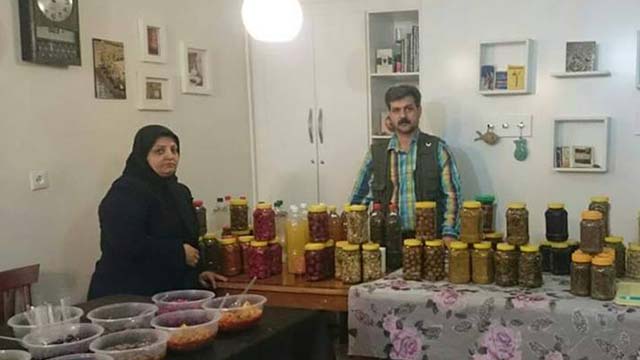Imprisoned Labor Activist on Hunger Strike Needs Hospital Treatment, Wife Says

Reza Shahabi and his wife in their home grocery store.
Three weeks on hunger strike in Rajaee Shahr Prison have inflicted serious physical harm on prominent labor activist Reza Shahabi, his wife said in an interview with the Center for Human Rights in Iran (CHRI).
“I saw him on Wednesday [August 30, 2017]; he wasn’t at all well,” Robabeh Rezaei said. “He has lost weight and has fluctuations in his blood pressure and sugar levels, which is natural when you are on a hunger strike. But he also has headaches and severe back pain and the left side of his body has gone numb. These are bad signs. My husband needs to be hospitalized and get checked by a specialist but the prison authorities and the prosecutor are not giving permission.”
Shahabi, 45, is one of more than 15 political prisoners on a mass hunger strike in the prison located in Karaj, 31 miles west of Tehran. He began his hunger strike on August 9, 2017, to protest being returned to prison two years after being released.
“Reza is demanding to be freed unconditionally because he says he has completed his prison term and any additional time behind bars would be against the law,” his wife said.
A board member of the Union of Workers of the Tehran and Suburbs Bus Company, Shahabi returned to prison on August 8 after receiving several warnings that he would lose his security deposit if he refused to serve the remainder of the prison sentence.
He was arrested in June 2010 and sentenced to six years in prison after being convicted of “propaganda against the state” and “assembly and collusion against national security” by Branch 15 of the Tehran Revolutionary Court. He was also banned from engaging in civic activism for five years.
In September 2014, he was granted medical furlough after posting bail set at 200 million toman ($62,000 USD). He remained free and assumed that his time outside prison for medical treatment and recuperation would be deducted from his sentence.
However, upon returning to Rajaee Shahr Prison, he learned that “the authorities were not only going to make him serve five months for the time he spent outside prison for medical treatment, but also enforce a previous one-year conviction. That means he has to stay in prison until December 2018,” one of Shahabi’s colleagues told CHRI on condition of anonymity on August 17.
The one-year sentence added stems from a conviction for his alleged part in the April 17, 2014 clash between guards and prisoners in Evin Prison that left many prisoners injured and became known as “Black Thursday.”
“I am worried for him because the same thing happened to him the last time he went on a hunger strike and he was hospitalized half-paralyzed,” Robabeh Rezaei told CHRI.
“The prison authorities have a duty to send my husband to the hospital but they are refusing to do so. They are refusing to send any of the hunger strikers to the hospital.”
According to Article 102 of the State Prisons Organization’s regulations, the prison clinic must give prisoners a medical checkup at least once a month, and Article 103 recognizes the need to hospitalize prisoners for emergencies.






